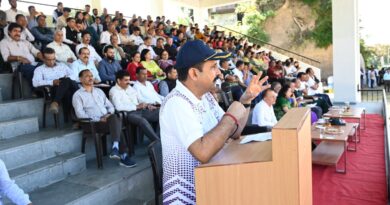HGVS Dialogue on Environment, Ecology, and Land Issues held
- The Himalayas must worry about the Himalayas themselves – Dr. S.S. Chandela
- It is essential to determine accountability towards oneself – Deepak Sanan
- 9 sub-committees formed to prepare an alternative development model for the state
The Himachal Gyan Vigyan Samiti (Himachal Knowledge Science Committee) organized a dialogue today at the YWCA with scientists, subject experts, and social activists on what should be the sustainable development model for the state. The dialogue extensively discussed the topics of ecology, environment, and disasters.
The committee’s chairman and state coordinator of the environment sub-committee, Dr. Om Prakash Bhureta, proposed forming sub-committees on eight subjects, including environment, ecology, and land-use. Scientists and subject experts will be included in these sub-committees to develop a shared understanding on each topic. A session will be organized in November where the understanding of all sub-committees will be shared to prepare a document. This document will encompass sustainable and balanced development, environmental protection, rational land use, potential interventions for disaster management, and various aspects of water, forest, and land use. Dr. Bhureta said that if necessary, suggestions for policy changes will also be given to the government. The document will also mention the role of the public.
Retired scientist from the Science and Technology Council, Dr. S.S. Chandela, said that now the Himalayas themselves will have to worry about the Himalayas. To save the state from disasters, people will have to take responsibility themselves. He stated that the state’s scientists and experts must create a shared understanding on what the state’s development model should be and raise public awareness. The benefits of large projects like hydroelectric projects and four-lane highways for the common people must be understood by assessing the damage caused to people and the environment during their construction.
Meanwhile, former administrative officer Deepak Sanan said that we must ensure our accountability along with our responsibilities. He said that plans and money are given for new construction, whereas sustainable development requires financial support for the maintenance of old structures. He warned that identity-based politics divides the public and pits them against each other, whereas mutual trust and solidarity are needed.
Disaster management expert Anuradha from a voluntary organization said that currently, help is provided by the government after a disaster occurs, but the government has no provisions for preparedness efforts to deal with disasters.
Dr. Kuldeep Singh Tanwar said that the disaster is not only what is visible, but this disaster has also affected small and medium farmers, vegetable producers, and livestock rearers whose crops have been destroyed and who have no alternative source of income.
Cloud bursting within the fragile Himalayan ecosystem is driven by climatic shifts in rainfall patterns, exacerbated by deforestation and unsustainable land-use practices. The region’s pronounced susceptibility to landslides is further compounded by its steep topography, geological instability, and anthropogenic activities such as road cutting and hydropower tunneling. Mitigating these risks necessitates an evidence-based approach involving stringent regulation of large-scale infrastructure projects, ecological restoration through afforestation, and comprehensive watershed management. Complementary strategies include deploying early warning systems, implementing slope stabilization measures, and fostering community-based disaster resilience. Paramount to this effort is the adoption of participatory governance, ensuring local communities guide land-use policy. Sustainable development in the Himalayas must, therefore, reconcile economic objectives with the imperative of ecological conservation to ensure the long-term protection of its water, forest, and soil resources.
During the dialogue, the pain of the disaster-affected people also came to the fore. Those affected by the damage caused by the four-lane in Bhattakufar, Shimla, and whose houses were declared unsafe, reported that there is no policy for the families who have been rendered homeless. They do not know if they will ever be able to live in their houses again.
Govind Chatranta, a resident of Thana village in Jubbal, said that his village, Thana, is sinking due to the Sawra-Kuddu Hydel Project. He said they have had to relocate the village three times already.
Retired scientist from the Pollution Control Board, Surender Shandil, said that policies are made but they do not reach the people. He emphasized spreading awareness among people about these policies.
Approximately 35 people participated in the dialogue, including the committee’s secretary Satyavan Pundir, Sumitra Chandela, Preetam Lal Negi, Ravindra Sharma, and Jagdeep Panwar.



